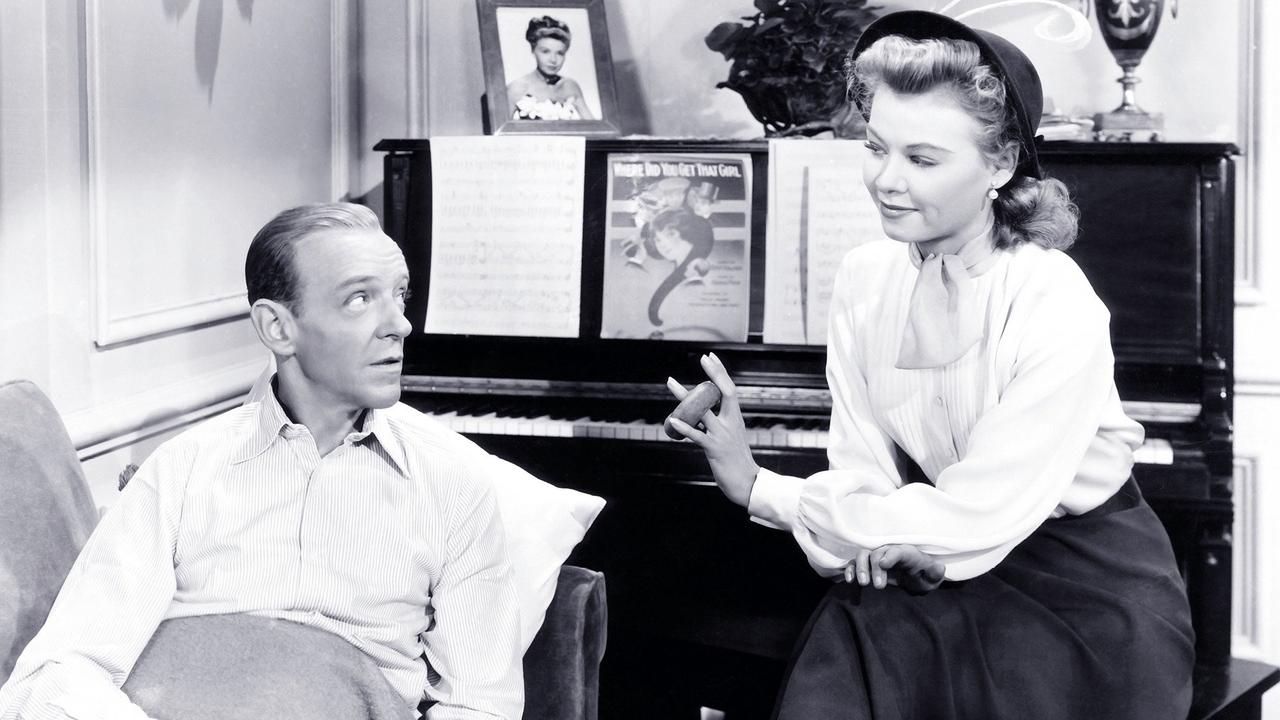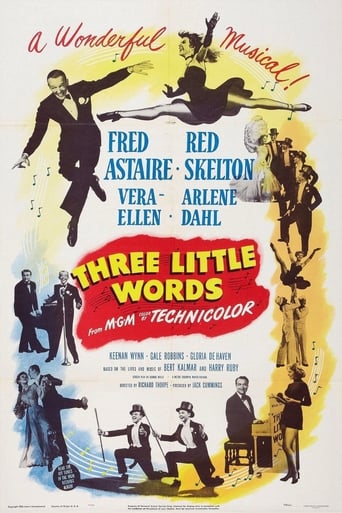

Self-important, over-dramatic, uninspired.
... View Moreone of my absolute favorites!
... View MoreThere's a more than satisfactory amount of boom-boom in the movie's trim running time.
... View MoreI think this is a new genre that they're all sort of working their way through it and haven't got all the kinks worked out yet but it's a genre that works for me.
... View MoreThe talent alone in this film is enough to blow your boots off. Fred Astaire, Red Skelton, Vera-Ellen, and a cameo by a young Debbie Reynolds. Astaire and Skelton portray the famous song writing team of Bert Kalmar and Harry Ruby. The film follows the foibles and tribulations of their partnership over the years. The dancing can't be beat pairing Fred Astaire and Vera-Ellen so settle in, you are due for a treat. Also Debbie Reynolds who sings in the manner of Betty Boop was a surprise! Nothing today is a good as the golden age of Hollywood - a gem!
... View MoreBecause I am a retired history teacher, I have got to point out that this film is mostly fiction. The opening says it's 'BASED on the lives and music of Bert Kalmar and Harry Ruby'. While there was a real life song writing duo of Kalmar and Ruby, much of what you see in the film was pure hogwash. The duo actually LIKED each other and none of the friction between them in the film actually existed in real life. HOWEVER, even though I know this, I still had to watch the film for one reason--it stars Fred Astaire! Heck, I'd watch him in any movie...period. It's not just his dancing and singing that I like, but it's his classy persona in films. It's hard not to like the guy and want to see him in ALL his movies! This movie was an interesting experience for me. Usually, I watch old MGM musicals on my own because my family thinks these sorts of films are silly. Well, recently I got my oldest to watch a few of these films but tonight I was surprised when my wife also sat down to watch. And, my youngest joined in to see the film. And, surprisingly, they all had a great time watching it. Now it's not surprising I'd like it--but the rest of my family, too! Overall, we had a great time--even if the story was pretty much fictionalized.A couple things to look for in the film is the baby dance (you'll love it when they start tossing the kid about) as well as the rather offensive Kalmar-Ruby tune about the Japanese.
... View MoreYou have to love a movie with dance and song! I had never heard of this movie but received it as a Christmas gift by a good friend who knew my love for old movies of this genre. I also love movies about real people and historical things. This movie is based on the lives of two song people from the early 1900's. Lot's of good music to listen to and great dance to watch, with a nice plot line. The movie featured an all star cast including Fred Astaire and Red Skeleton. I only knew Red as a comedian so it was fun to see him take on the role of a somewhat serious nature. Vera Ellen was quite glamorous and was fun to watch in the dance numbers. Hairdo's, clothing, sets all very interesting to see, a glimpse from the past.. Very enjoyable way to spend an evening.
... View MoreThis was a wonderful, feel-good movie with tons of songs, many of them appealing. There also were some great dancing scenes, no surprise there since Fred Astaire is one of the stars. Astaire and Vera-Ellen paired up well for those numbers.This is one of the few films, even in the musicals, in which all the characters were nice people. In other words, there were no villains, no nasty people, which is refreshing to see now and then. It is supposedly the true-life account of songwriters Bert Kalmar (Astaire) and Harry Ruby (Red Skelton). Ruby is good at writing tunes, but not with lyrics. Kalmar supplies the lyrics and dance. Skelton also shows he had a decent singing voice.The only unhappy moments in the movie are the squabbles between the two leading men, but that's not overdone and sometimes it's humorous. Skelton's character is the nicer of the two.The leading ladies are wholesome-looking beautiful women. Vera-Ellen is a Shirley Jones-type pretty blonde with a great dancer's body. She's enjoyable to watch. Arlene Dahl, who was stunning, is the other leading female but her role was minor, unfortunately.The movie is a good mixture of song, dance, comedy and drama and is an underrated film in that it that doesn't get a lot of publicity. Astaire was quoted as saying this was his favorite film. I agree. It's my favorite of his, too.
... View More